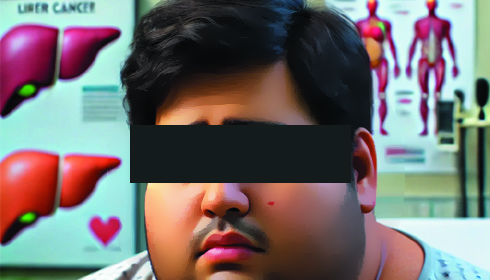
Obese People 1.5 Times More Like to Face Liver Cancer Risk: Osaka Study Findings
A recent study from Osaka Metropolitan University found a relationship between obesity, diabetes, and the recurrence of hepatocellular carcinoma (HCC), a kind of liver cancer. Dr. Hiroji Shinkawa led the study, which discovered a 1.5-fold greater recurrence rate in obese individuals within two years of surgery. More importantly, the risk of recurrence increases dramatically five years after surgery, with a 3.8-fold increase among obese people. The findings have significant implications for liver cancer treatment, particularly for patients with metabolic disorders.
Hepatocellular carcinoma or liver cancer, which is frequently associated with hepatitis B and C infections, is becoming less common as antiviral medicines improve. However, the increased global prevalence of obesity and diabetes has brought new levels of difficulty to liver cancer treatment. Metabolic disorders such as obesity and diabetes have long been associated with poorer outcomes in various cancer types. This investigation revealed a significant impact of these conditions on liver cancer recurrence rates.
The study, which included 1,644 patients who underwent liver resection for HCC, aimed to investigate the long-term effects of obesity and diabetes on cancer recurrence rates. Researchers investigated both early and late recurrence. Intrahepatic metastasis, where the underlying cancer seeded new tumours through the portal vein, primarily caused early recurrence, defined as occurring within two years of surgery. In contrast, late recurrence (more than two years) was linked to multicentric carcinogenesis, frequently caused by hepatic inflammation and fibrosis.
While early recurrence rates were similar between obese and non-obese patients, obese patients had a considerably greater risk of recurrence after two years, emphasising the significance of long-term monitoring. Obese patients had a 3.8-fold greater risk of recurrence five years after surgery. Meanwhile, those with diabetes alone experienced a twofold increase within the same time.
These data highlight that obesity and diabetes are not trivial problems but rather important risk factors for liver cancer recurrence, particularly in the long term. Dr. Shinkawa emphasised the importance of comprehensive therapy regimens that address both cancer and underlying metabolic disorders. "This study emphasises the need for treating metabolic abnormalities in hepatocellular cancer patients. Obesity and diabetes management should be an important component of therapeutic regimens for minimising cancer recurrence and increasing survival rates, he stated.
Various molecular pathways potentially explain the link between obesity, diabetes, and liver cancer recurrence. Increased systemic inflammation, insulin resistance, and changes in insulin-like growth factor 1 (IGF-1) are associated with obesity, particularly when combined with diabetes. IGF-1 promotes anti-apoptosis (preventing cancer cell death) and angiogenesis (creating new blood vessels to nourish the tumour).
People who are overweight or obese may also have a higher risk of getting cancer again because their fatty liver can lead to hepatocarcinogenesis, the process by which normal liver cells turn into cancerous ones. Diabetes exacerbates this problem, as insulin resistance has been linked to the development and progression of several malignancies, including HCC.
The study's findings have far-reaching consequences for managing liver cancer patients who are obese or diabetic. Beyond traditional cancer treatments such as surgery, chemotherapy, and antiviral medicines, addressing these metabolic problems must become a top concern. Weight loss, dietary improvements, and diabetic management could all help reduce the probability of cancer recurrence.
Furthermore, the study emphasises the importance of early intervention and ongoing long-term surveillance of HCC patients with obesity or diabetes. While antiviral therapies have reduced hepatitis-related HCC incidence, the growing global burden of metabolic illnesses necessitates a comprehensive strategy for liver cancer treatment.
The Osaka Metropolitan University study adds persuasive evidence to an expanding body of studies linking metabolic problems to cancer outcomes. Obesity and diabetes not only lower the patient's prognosis, but they also raise the likelihood of long-term recurrence, especially in liver cancer. As the frequency of these metabolic illnesses increases globally, healthcare professionals must adopt more extensive, complex treatment techniques to manage the dual burden of cancer and obesity-related diseases.